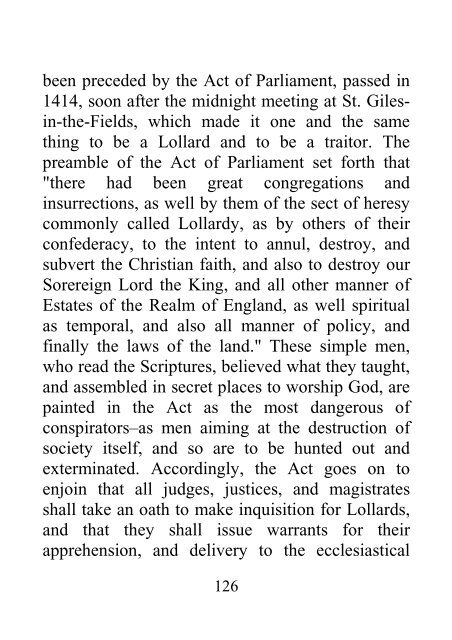In England from Wicliffe to Henry VIII - James Aitken Wylie
You also want an ePaper? Increase the reach of your titles
YUMPU automatically turns print PDFs into web optimized ePapers that Google loves.
een preceded by the Act of Parliament, passed in<br />
1414, soon after the midnight meeting at St. Gilesin-the-Fields,<br />
which made it one and the same<br />
thing <strong>to</strong> be a Lollard and <strong>to</strong> be a trai<strong>to</strong>r. The<br />
preamble of the Act of Parliament set forth that<br />
"there had been great congregations and<br />
insurrections, as well by them of the sect of heresy<br />
commonly called Lollardy, as by others of their<br />
confederacy, <strong>to</strong> the intent <strong>to</strong> annul, destroy, and<br />
subvert the Christian faith, and also <strong>to</strong> destroy our<br />
Sorereign Lord the King, and all other manner of<br />
Estates of the Realm of <strong>England</strong>, as well spiritual<br />
as temporal, and also all manner of policy, and<br />
finally the laws of the land." These simple men,<br />
who read the Scriptures, believed what they taught,<br />
and assembled in secret places <strong>to</strong> worship God, are<br />
painted in the Act as the most dangerous of<br />
conspira<strong>to</strong>rs–as men aiming at the destruction of<br />
society itself, and so are <strong>to</strong> be hunted out and<br />
exterminated. Accordingly, the Act goes on <strong>to</strong><br />
enjoin that all judges, justices, and magistrates<br />
shall take an oath <strong>to</strong> make inquisition for Lollards,<br />
and that they shall issue warrants for their<br />
apprehension, and delivery <strong>to</strong> the ecclesiastical<br />
126

















